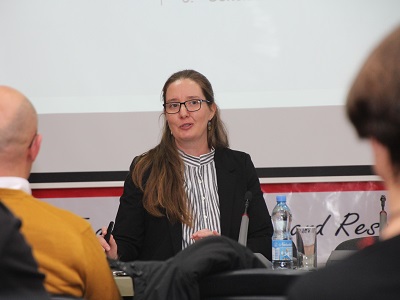University of Warwick Researcher Presents to ISET Community
- Details

On December 13, Ellie Martus, a co-fund fellow at the University of Warwick, visited ISET to talk about environmental state capacity in Georgia and other countries of the former Soviet Union. She presented an overview of her research, under the framework of which she is going to explore the capacity of Georgia, Russia, Ukraine and Armenia to design, implement and enforce environmental policies.
Ellie Martus analyzed Georgia’s environmental state capacity in four dimensions: regulation, administration, ideas and expert knowledge, and sites of contestation. With the help of surveys and interviews among governmental entities, NGOs and environmental groups, she revealed several challenges in all of the above-mentioned dimensions and presented her results to the ISET community. She finished by giving general tentative recommendations, and explained that the final conclusions will be shown later, as she is going to continue her research on the topic in Georgia and other select post-Soviet countries.
Discussing Preliminary Results of RIA on Draft Law on Windbreaks
- Details

On December 10-11, ISET’s APRC team organized a comprehensive stakeholder dialogue to discuss the interim results of the RIA on draft Law on Windbreaks. The two-day workshop gathered representatives of the Agrarian Committee of the Parliament of Georgia, the Ministry of Environmental Protection and Agriculture, municipalities, the private sector (principally in the form of farmers), international donors (IFAD, GIZ) and various NGOs.
First, the research team presented the approach that was used to consider the 2030 Agenda of Sustainable Development Goals (SDGs) in the RIA process. This presentation featured how the main principles of Agenda 2030 (such as the concepts of ‘leave no one behind’, shared responsibility, accountability, universality and integrated approaches) were considered in the different steps of the RIA. The linkages of the draft law with different SDGs were also outlined and discussed with the audience.










